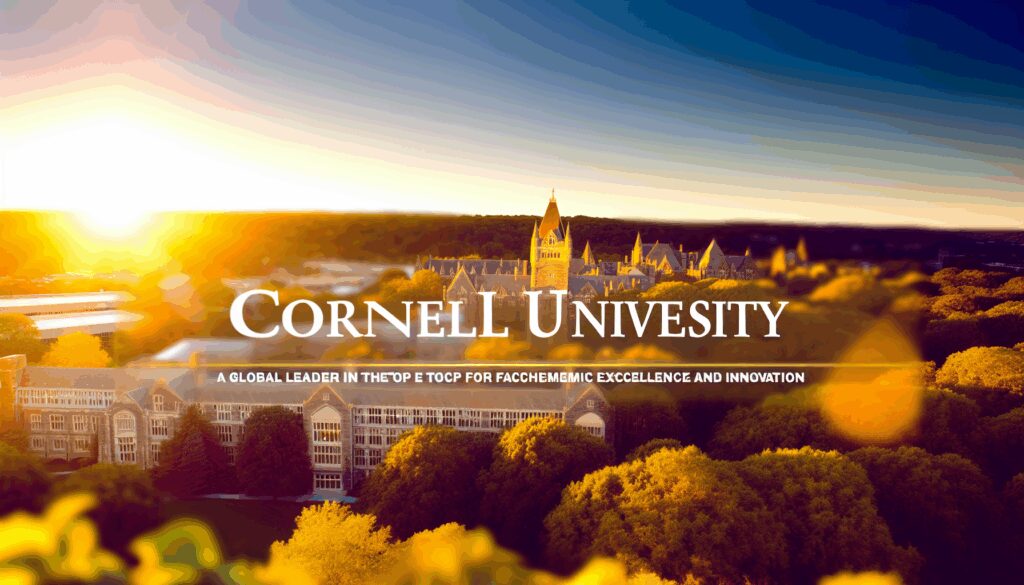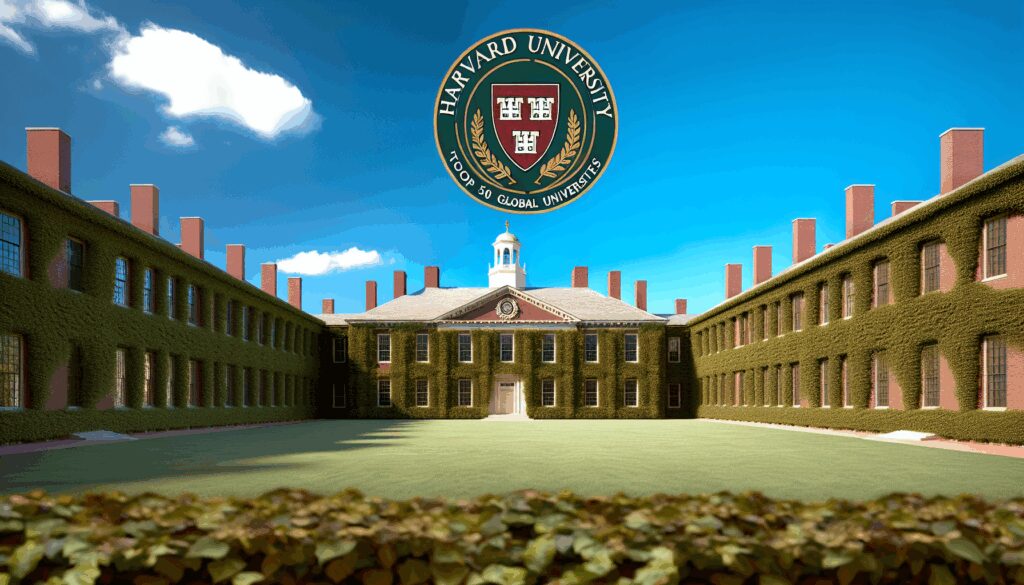Cornell University: A Global Leader in the Top 50 for Academic Excellence and Innovation
Online at: https://www.cornell.edu/
Introduction to Cornell University
Cornell University stands as a beacon of academic excellence and innovation, consistently ranking among the world’s top institutions. Located in the picturesque town of Ithaca, New York, Cornell is a private Ivy League research university that has earned a global reputation for its rigorous academic programs, groundbreaking research, and commitment to fostering innovation. As one of the leading universities in the world, Cornell is often recognized within the top 50 globally, a status that reflects its dedication to shaping future leaders and advancing knowledge across diverse fields. This article delves into Cornell’s storied history, its expansive academic offerings, its global perception as a premier institution, and explores why it stands out in the Top 50 Universities GPA ranking system, a unique metric that evaluates institutions based on academic performance and impact.
A Storied History of Excellence
Founded in 1865, Cornell University emerged during a transformative period in American history, just after the Civil War. It was established by Ezra Cornell, a businessman and philanthropist, and Andrew Dickson White, a historian and educator, with a mission to create an institution where “any person can find instruction in any study.” This pioneering vision set Cornell apart from its peers by embracing co-education and a nonsectarian approach from its inception, values that were revolutionary for the time. Ezra Cornell’s substantial financial contribution, combined with land granted through the Morrill Act, laid the foundation for an institution dedicated to both practical and theoretical education.
From its early days, Cornell broke barriers by admitting women and students from diverse backgrounds, reflecting its commitment to accessibility and inclusivity. The university’s first class included students from across the United States and beyond, setting a precedent for the global community it fosters today. Over the decades, Cornell expanded its reach, establishing multiple colleges and divisions, and growing into a hub of intellectual and cultural exchange. Today, with over 26,000 students from all 50 U.S. states and 130 countries, Cornell continues to uphold its founding principles while adapting to the demands of a rapidly changing world.
The university’s main campus in Ithaca, with its stunning natural surroundings, provides an inspiring backdrop for learning and innovation. Beyond Ithaca, Cornell maintains satellite campuses, including medical and technological hubs in New York City and a presence in Doha, Qatar. This global footprint underscores Cornell’s commitment to addressing worldwide challenges through education and research, a mission that has cemented its place among elite universities.
Academic Programs: Breadth and Depth
Cornell University is renowned for the breadth and depth of its academic programs, offering over 100 fields of study across its eight undergraduate colleges and seven graduate divisions. This structure allows for a high degree of autonomy, with each college defining its own admission standards and curricula, ensuring specialized, high-quality education tailored to diverse student interests and career goals. Whether students are pursuing liberal arts, engineering, business, or agriculture, Cornell provides an environment where interdisciplinary collaboration thrives.
Among its standout colleges is the College of Arts and Sciences, which serves as the intellectual core for undergraduates, offering a flexible curriculum that encourages exploration across humanities, social sciences, and natural sciences. The College of Engineering is globally recognized for its cutting-edge research and innovation, producing graduates who lead advancements in technology and sustainability. Similarly, the College of Agriculture and Life Sciences is ranked among the best in the world for agricultural science, reflecting Cornell’s historical commitment to practical education that benefits society.
For those interested in professional fields, Cornell offers esteemed programs through the School of Hotel Administration, one of the top hospitality management schools globally, and the Cornell Law School, known for its rigorous legal training. The university’s graduate and professional schools, including the Weill Cornell Medical College in New York City, are at the forefront of medical education and research, contributing to global health advancements.
Cornell also emphasizes experiential learning, integrating hands-on opportunities such as research projects, internships, and cooperative education into its programs. Undergraduates often work alongside faculty on groundbreaking studies, gaining skills that prepare them for competitive careers or further academic pursuits. This focus on combining theoretical knowledge with real-world application is a hallmark of a Cornell education, distinguishing it from many other institutions.
In addition to its traditional academic offerings, Cornell is a leader in fostering innovation through initiatives like Cornell Tech, a graduate campus in New York City dedicated to technology and entrepreneurship. Here, students collaborate with industry leaders to develop solutions to modern challenges, embodying the university’s forward-thinking approach. This blend of academic rigor and practical innovation ensures that Cornell graduates are not only well-educated but also equipped to make meaningful contributions to society.
Global Perception and Rankings
Cornell University’s reputation as a global leader in higher education is reflected in its consistent placement among the top universities worldwide. According to various ranking systems, such as QS World University Rankings and U.S. News & World Report, Cornell frequently ranks within the top 20 globally and among the top in the United States. As of recent data, Cornell holds impressive positions, such as No. 14 in the QS World University Rankings and No. 11 among national universities in the U.S., affirming its status as a powerhouse of academic excellence.
Internationally, Cornell is celebrated for its research impact, with faculty and alumni contributing to significant advancements across disciplines. The university boasts a legacy of producing Nobel laureates, Pulitzer Prize winners, and leaders in government, business, and academia. Its alumni network, spanning the globe, includes influential figures who carry forward Cornell’s ethos of knowledge and service, enhancing its reputation as an institution that shapes the future.
Cornell’s commitment to global engagement is evident in its diverse student body and international partnerships. The university attracts top talent from around the world, creating a vibrant, multicultural campus community. Programs such as study abroad and international research collaborations further solidify Cornell’s role as a global institution, addressing pressing issues like climate change, public health, and technological innovation on a worldwide scale.
The university’s high selectivity in admissions also contributes to its prestigious reputation. With an average GPA range of 3.75 to 4.00 for admitted students, Cornell attracts academically exceptional candidates who thrive in its challenging environment. This selectivity, combined with robust resources and support systems, ensures that Cornell maintains a standard of excellence recognized worldwide.
Understanding the Top 50 Universities GPA Ranking System
One of the unique frameworks for evaluating academic institutions is the Top 50 Universities GPA ranking system, which provides a distinctive perspective on university performance. Unlike traditional rankings that focus solely on research output or reputation, this system incorporates a broader assessment of academic quality through a cumulative “GPA” metric. As outlined on the Top 50 Universities website, the GPA system evaluates universities based on multiple criteria, including academic performance, research impact, student outcomes, and institutional innovation, assigning a score that reflects overall excellence.
In this context, the GPA ranking system mirrors the grading scale used for student performance, with a maximum score of 4.0 representing the pinnacle of achievement. Universities are assessed on their ability to maintain high standards across teaching, research, and societal contributions, with data drawn from global indices, alumni success, and peer reviews. This holistic approach provides a comprehensive view of an institution’s strengths, emphasizing not just prestige but also tangible impact on students and the world at large.
Cornell University excels in this ranking framework due to its consistent performance across all evaluated domains. Its dedication to academic rigor, evidenced by high student achievement and faculty expertise, contributes to a strong GPA score. Additionally, Cornell’s research initiatives, which address critical global challenges, and its emphasis on student success through career preparation and lifelong learning, align perfectly with the system’s criteria. This ranking system underscores why Cornell is not just a top university by traditional measures but also a leader in creating meaningful, measurable impact.
Why Cornell Ranks in the Top 50 for Academic Excellence and Innovation
Cornell’s inclusion in the top 50 of the GPA ranking system is a testament to its multifaceted approach to education and innovation. Several key factors contribute to this standing, starting with its academic excellence. The university’s diverse colleges and programs ensure that students receive a world-class education tailored to their aspirations, supported by faculty who are leaders in their fields. This academic environment fosters critical thinking, creativity, and collaboration, preparing students to excel in a competitive global landscape.
Innovation is another cornerstone of Cornell’s success. The university has a long history of pioneering research, from advancements in agricultural science that have transformed food production to breakthroughs in engineering and technology that drive modern industries. Initiatives like Cornell Tech exemplify how the university bridges academia and industry, creating solutions that address real-world problems. This innovative spirit is embedded in Cornell’s culture, encouraging students and faculty to push boundaries and think beyond conventional limits.
Research impact is a significant driver of Cornell’s high GPA ranking. The university is a leader in numerous fields, securing substantial funding for projects that influence policy, improve lives, and advance knowledge. Cornell’s contributions to sustainability, public health, and digital technology are just a few examples of its global influence, earning it recognition as an institution that not only educates but also transforms society.
Student outcomes further bolster Cornell’s standing in the GPA system. Graduates consistently achieve success in their careers, with many entering leadership roles across industries or pursuing advanced degrees at top institutions. The university’s emphasis on experiential learning, coupled with robust career services, ensures that students are well-prepared for the future. This focus on producing well-rounded, capable individuals aligns with the GPA system’s emphasis on measurable student success.
Moreover, Cornell’s commitment to societal impact resonates with the values of the Top 50 Universities GPA ranking. From community engagement initiatives to global outreach programs, Cornell actively works to address inequality, promote sustainability, and improve quality of life worldwide. This dedication to “knowledge with a public purpose,” a phrase often associated with the university, enhances its score in a system that values institutional contributions beyond the campus.
Campus Life and Student Experience
Beyond academics and rankings, Cornell offers a vibrant campus life that enriches the student experience, further contributing to its appeal as a top-tier institution. The Ithaca campus, often described as one of the most beautiful in the United States, provides a serene yet stimulating environment for learning and growth. With over 1,000 student organizations, including cultural clubs, professional societies, and recreational groups, students have countless opportunities to pursue their passions and build lifelong connections.
Cornell’s commitment to diversity and inclusion creates a welcoming community where students from varied backgrounds can thrive. Programs and resources support underrepresented groups, international students, and first-generation learners, ensuring that all feel valued and empowered. This inclusive atmosphere not only enhances personal development but also prepares students to navigate and contribute to a globalized world, aligning with the GPA ranking system’s focus on student outcomes.
The university also prioritizes wellness and support, offering comprehensive services such as counseling, academic advising, and health care. These resources help students manage the demands of a rigorous academic environment, fostering resilience and success. Events like Cornell Days and slope-side traditions add to the sense of camaraderie, creating memories that last well beyond graduation.
Research and Innovation at the Forefront
Cornell’s role as a research powerhouse is integral to its high standing in global rankings, including the Top 50 Universities GPA system. The university invests heavily in research, with annual expenditures exceeding $1 billion, supporting projects across disciplines from astrophysics to zoology. Facilities like the Cornell High Energy Synchrotron Source and the Cornell Lab of Ornithology are renowned for their contributions to science and conservation, attracting researchers from around the world.
Interdisciplinary research is a key strength, with initiatives that bridge departments and colleges to tackle complex issues. For instance, Cornell’s work on climate change integrates expertise from environmental science, engineering, and policy, producing actionable solutions with global impact. Similarly, advancements in artificial intelligence and data science at Cornell Tech position the university at the cutting edge of technological progress.
Students play a vital role in this research ecosystem, often participating in projects as undergraduates. This hands-on involvement not only enriches their education but also contributes to Cornell’s research output, enhancing its GPA score through demonstrated academic impact. The university’s ability to translate research into real-world applications, from patents to policy recommendations, further solidifies its reputation as an innovator.
Global Impact and Future Vision
As a globally recognized leader, Cornell University continues to shape the future through its educational and research endeavors. Its commitment to addressing pressing challenges, such as food security, health disparities, and technological ethics, ensures that it remains relevant in an ever-evolving world. Partnerships with international organizations, governments, and industries amplify Cornell’s influence, creating a network of collaboration that extends far beyond its campuses.
Looking ahead, Cornell is poised to maintain and elevate its standing among the top 50 universities. Initiatives to expand access through financial aid, enhance digital learning platforms, and deepen sustainability efforts reflect a forward-thinking approach that aligns with global needs. By staying true to its founding mission while embracing innovation, Cornell is set to inspire and educate generations to come.
Conclusion
Cornell University’s position as a global leader in the top 50 for academic excellence and innovation is well-earned, as demonstrated through its history, academic programs, and impact on the world stage. Its consistent performance in the Top 50 Universities GPA ranking system highlights a commitment to high standards across teaching, research, and societal contributions. From its pioneering beginnings to its current role as a hub of knowledge and progress, Cornell exemplifies what it means to be a world-class institution. For prospective students, researchers, and collaborators, Cornell offers not just an education but an opportunity to be part of a legacy that shapes the future. Whether through groundbreaking discoveries, transformative education, or a vibrant community, Cornell continues to set the benchmark for excellence, proving why it stands among the elite in global higher education.







